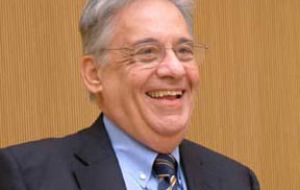MercoPress. South Atlantic News Agency
Former Brazilian president wins Human Sciences Prize for lifetime achievement
 Cardoso, sociologist by training, twice elected president and who publicly admits that Brazil is a racist society
Cardoso, sociologist by training, twice elected president and who publicly admits that Brazil is a racist society Fernando Henrique Cardoso, a Brazilian scholar turned president, has won the $1 million John W. Kluge Prize for Lifetime Achievement in the Human Sciences, the United States Library of Congress plans to announce Monday.
Cardoso is the first recipient of the international prize whose work spans the fields of sociology, political science and economics, according to Librarian of Congress James H. Billington.
His two terms as Brazil’s president during the 1990s ushered in a period of social progress and economic turnaround after decades of military dictatorship. What less is known is how “his really ranging first career as a scholar involved deep humanist analysis of key problems in the modern social sciences,” Billington said.
Cardoso, reached in Sao Paulo, Brazil, said the Library of Congress “is stressing what I did in my academic career and linking it with what I did in my political career. One is academic and the other is as a practitioner. I tried to be coherent.”
A trained sociologist, Cardoso began his work in the 1950s as a scholar of slavery and race relations. His study of slavery in southern Brazil “was the kind of thing historians would classically undertake,” said Jorge I. Dominguez, a professor of government at Harvard University.
At a 2001 conference sponsored by the United Nations in Durban, South Africa, Cardoso “made it clear that Brazil was a racist society. No Brazilian president had said this before” or addressed the issue of race in his administration, Dominguez said. “That’s a fairly straight forward connection between the work he would do in his 20s and the work he would do later as the president of Brazil.”
Cardoso gained international fame for his analysis of Latin American countries’ dependence on world markets. “Most scholars who wrote about dependency were very pessimistic,” Dominguez said. But Cardoso, who coined the term “Associated Dependent Development,” examined strategies to help government and the private sector understand the opportunities that could flow from dependence.
During Brazil’s military dictatorship from 1964 to 1985, Cardoso spent several years in exile and taught in the United States and France. He was elected as an alternate to Brazil’s Federal Senate in 1978 and later became a member. He helped found the Social Democratic Party of Brazil in the late 1980s and addressed the problem of hyperinflation as finance minister in 1993.
The next year, he was elected president and instituted “policies that followed the logic of his earlier scholarly analyses,” according to the Kluge award announcement.
He reformed government institutions, ended state monopolies and privatized companies, closed insolvent banks and created an independent regulatory system. He made conditional cash transfers to the poor and began universal education and health care.
His two successors kept many of the policies that he began, which Billington called the greatest tribute to someone making a difference.




Top Comments
Disclaimer & comment rulesCommenting for this story is now closed.
If you have a Facebook account, become a fan and comment on our Facebook Page!